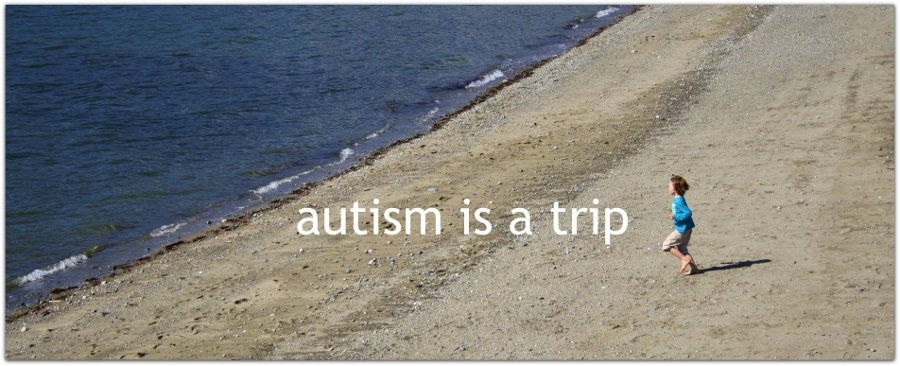Be A Friend: What to Do When A Child You Know is Diagnosed
Among family and those I consider close friends (people I have real, off-the-computer relationships with), more than thirty of their children are either on the autism spectrum, suspected of being on it, or have associated behaviours (ADHD, etc). In the last month alone, two dear friends have had a child diagnosed with autism.
Autism is everywhere, and that’s all right. Learning a child actually has autism, however, can be quite a shock.
We suspected Jack had at least a sensory processing disorder, and were actually hoping for an official autism diagnosis. With a diagnosis comes support and interventions.
When the psychiatrist at his evaluation actually suggested autism, though, it was an ice cold smack in the face.
Sometimes, even when you know your child is autistic, it hurts to hear it out loud.
Hearing the words, seeing the actual reports and assessments in your hands… somehow changes the game. You’re no longer on the sidelines, rather, you’re suddenly center field with the ball in your hands. Game on.
So now what?
As the saying goes, there is no rest for the weary. Parents of a newly diagnosed child are suddenly inundated with action plans, financial concerns, and their own, often conflicted, emotions.
And people who want to help. Lots and lots of well-intentioned people.
Parents of autistics are often overwhelmed with good intentions that are not always constructive. Some actually hurt. I doubt most of these folks even realize what they’re doing.
So, I came up with a few suggestions.
Things you should not say or do to a parent with a newly diagnosed child:
1) Express sorrow and/or pity.
The child has not died, and has not been diagnosed with a terminal illness. Autism is a life-long condition, but it’s not a death sentence. Please don’t act as if it is. Sympathy is good, pity is not.
2) Immediately suggest a diet/test/protocol.
Every person with autism is different, and not all respond in the same manner to the same things. The family will likely explore all of their options to find out what will work best for their child.
3) Start forwarding them every single article/email/meme/book that mentions the word autism.
They have just entered this world, and need some time to adjust. Drowning them in autism stories only complicates the situation.
4) Ask what they think caused the child’s autism.
To date, nobody knows what causes autism. There are a multitude of theories, but no concrete evidence, anywhere. Some studies point to genetics, some point to environmental influences, but none have a conclusive answer. Parents do nothing to “cause” their child’s autism, and asking this question passively-aggressively implies they did.
5) Share horror stories.
This is similar to scaring a first-time mom with horrible birth stories. Yes, autistic children wander, are abused in schools, and are open to any number of other terrible things. Just as you shouldn’t talk about how many babies die in a particular form of childbirth to a pregnant mother, don’t start listing off every bad thing that has happened to every autistic child ever. Just don’t.
6) If you’re a parent of an autistic child yourself, don’t smother them with “assistance.”
When the family is ready, they’ll reach out. Think about when your child was first diagnosed, and how you felt. Treat them the same way you wanted to be treated.
Instead, here are some things you definitely can and should do for someone with a newly diagnosed child:
1) Offer words of support.
Instead of an “I’m sorry,” give love and friendship. An “I’m here for you” goes a long way.
2) Wait until you’re asked to give advice/suggestions/help.
Stand back, give them some room to breathe. If you let them know you’re there whenever needed, they’ll come to you. And if they don’t, that’s all right, too. Don’t be offended.
3) If you’re an autism parent (or autistic) yourself, wait until you’re asked to share stories.
I know it’s tempting to share your tales of success and failures in various areas, but there will be plenty of time for that down the line.
4) Stay positive.
But don’t pander. Parents don’t need to hear that “at least” it’s high functioning autism or that s/he can speak, or anything else that minimizes the situation. It’s condescending and unnecessary. Instead, compliment the child. The child is the same today as s/he was before the diagnosis.
5) Ask “how can I help?”
Parents new to autism need some time to process what’s happening with them and their child. Take them a meal, watch their other children for a bit, or simply ask to help with laundry or other household chores. A little gesture or respite goes a long way.
6) Be a friend.
This one should be self-explanatory. Be there when they need you. Lend an ear or a shoulder. Give unconditional love. Autism can be a very isolating thing for everyone involved – knowing there are people to turn to is immeasurable.
Support is the number one thing families of autistics want and need. In any way, large or small, it all helps.
A version of this post originally appeared on redOrbit blogs.
Share this: Twitter | StumbleUpon | Facebook | digg | reddit | eMail Read MoreFacebook Group
Have you visited our Facebook page yet? Stop by sometime and check out the discussion page – I’ve created several questions that I’d love to see some answers to. There are some hotbutton topics, some coping issues, and some basic day-to-day things.
You should also feel free to post links to sites you find helpful or informative there (and I’ll most likely post them here, too). If you haven’t joined the Autism is A Trip Facebook page yet, just click on the Facebook button over there on the right.
Let’s start chatting!
Share this: Twitter | StumbleUpon | Facebook | digg | reddit | eMail Read MoreA Little Support
I am absolutely blown away at how quickly so many people jumped to help my friend in Michigan. It’s gotten me thinking about our history in special education, and I’ve realized something very important: we’ve made it this far not by relying on the professionals and agencies, but by seeking out other parents who have walked the same path. Every major question I’ve had has been answered by a mom in the preschool waiting room, a dad on the playground, or a complete stranger I’ve bonded with over vegetables and autism at the local grocery.
Autism is a social disease, but not always in a bad way. Autism has made me unafraid to approach a mom at a water park here in British Columbia and ask about how to get my son into the special education program. Autism made me bold enough to approach another mom of three boys at our local park. That particular encounter taught us how to get Jack into the French Immersion program here, and which school to try when the local school was full.
Autism has alternately made it hard for my child to be social, and made it easier for me.
So here’s my idea. I’m going to start a network of sorts here on the site of people who would like to be open to help others. If you’re interested (your commitment would be only to answer questions and guide others), let me know. If you need help, let me know and I’ll either put you in contact with someone in your area, or put the word out. We can help each other get the best results.
Let’s be social, shall we?
Share this: Twitter | StumbleUpon | Facebook | digg | reddit | eMail Read MorePlease Read This
Hi everyone! I have a whole bunch of new stuff to come over the next few days, but in the meantime, please read this awesome post by Lisa over at Reports from A Resident Alien. She is a biomedical engineering major at Wright State University, she was recently featured on NPR, she is autistic, and she is amazing.
10 Things Everyone Should Know About Autism
Share this: Twitter | StumbleUpon | Facebook | digg | reddit | eMail Read More
Unsolicited Parenting Advice
Every parent has encountered it. From the time you first venture out to the store with your brand new baby, people around you have something to say about your ability to raise it.
“That baby really needs some socks.”
“Why don’t you turn him around in that thing so he can see the world?”
“He needs a hat! It’s cold/sunny/misting gently out!!”
The “helpers” tend to fade out as the children get older, except those hardy few who will insist they know what’s best for your child in any given situation, especially if said child is misbehaving. Or appearing to misbehave. Or breathing.
Add autism to the mix, and let the fun times begin!
If you’ve ever taken a 3 or 4-year-old to the toy section of Target, you’ve felt my pain. There are buttons to be pushed, wheels to be turned, horns to be blown. And invariably, older citizens to irritate. One would assume that, being in the toy section, there might be actual children present. And, in the presence of a mind-boggling assortment of toys, said children will be on a rampage to absorb every bit of fun to be had before getting dragged along in search of a more perfect popcorn popper (true story).
We must have some sort of cranky person homing gene, because every time I let Jack (or Lennon, for that matter) have their way with the toys, one or more shows up. With a stern look. Or a disapproving nod. Or, thank goodness, advice.
I have been told my child needs a spanking. That he’s out of control. That if he can’t be responsible enough to stay with me and not run away, that I should have left him at home (obviously with my high-priced nanny, this being Los Angeles).
Just yesterday, one helpful man pointed out that I had said Jack’s name “about a hundred times.” Why thank you, sir, I hadn’t kept count. I was more concerned that my child might escape my sight and be kidnapped while he was counting how many different kinds of cars were on the shelf. Clearly my priorities were askew.
My favorite recent encounter, though, was during the glorious Target 75% off toys sale (one of my most hallowed holidays). By some stroke of luck, I only had Jack with me. This is a “grab what you can get super fast because it’s going to be gone if you look the other way” sale, so I didn’t really want to be chasing him all over the store. Amazingly, there was a whole shelf of Little People amusement parks for him to, well, amuse himself with. He sat himself down on the floor with a ferris wheel and played the music. Again, and again, and… well, you see where this is going.
I was having a fabulous time with my one occupied child. That is, until I realized that an older woman across the aisle in iPods and iPod accessories was trying to get my attention. She politely informed me, from about 50 feet away, that my child was annoying her by playing with this toy repeatedly, and that I really ought not to be letting him play with a toy I had “no intention of buying.”
I politely responded that if she was annoyed, she should probably move to another part of the store. You know, away from the TOYS.
Nevermind that the amusement park did indeed come home with us, it’s the principle. If I have happened across the one magical thing that will keep my child focused for more than 30 seconds, I’m going to seize upon it. If that annoys you, well that’s your problem.
Especially if you’re on the other side of the store.
************************************************
What “advice” have you been given while out with your children? Have you ever attempted to “educate” someone who’s given you unsolicited commentary?
Share this: Twitter | StumbleUpon | Facebook | digg | reddit | eMail Read More









